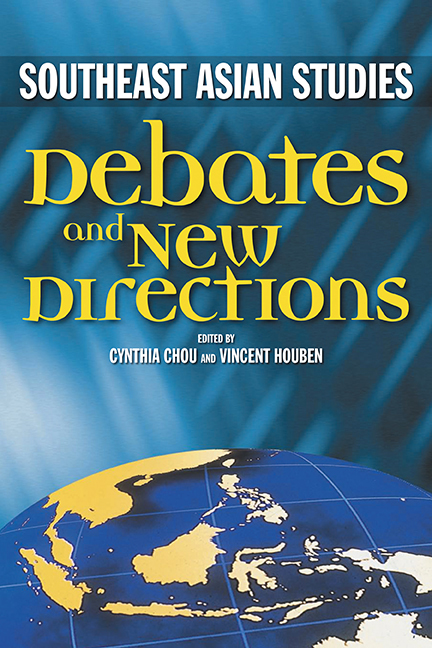Book contents
- Frontmatter
- Contents
- List of Contributors
- Preface
- 1 Introduction
- 2 Southeast Asia: Personal Reflections on a Region
- 3 Region, Academic Dynamics, and Promise of Comparitivism: Beyond Studying ‘Southeast Asia’?
- 4 Towards Multi-Laterality in Southeast Asian Studies: Perspectives from Japan
- 5 The Academic's New Clothes: The Cult of Theory versus the Cultivation of Language in Southeast Asian Studies
- 6 Rethinking Southeast Asian Politics
- 7 Reconceptualizing Southeast Asian Studies
- 8 Southeast Asian History: The Search for New Perspectives
- 9 Film, Literature, and Context in Southeast Asia: P. Ramlee, Malay Cinema, and History
- Bibliography
- Index
1 - Introduction
Published online by Cambridge University Press: 21 October 2015
- Frontmatter
- Contents
- List of Contributors
- Preface
- 1 Introduction
- 2 Southeast Asia: Personal Reflections on a Region
- 3 Region, Academic Dynamics, and Promise of Comparitivism: Beyond Studying ‘Southeast Asia’?
- 4 Towards Multi-Laterality in Southeast Asian Studies: Perspectives from Japan
- 5 The Academic's New Clothes: The Cult of Theory versus the Cultivation of Language in Southeast Asian Studies
- 6 Rethinking Southeast Asian Politics
- 7 Reconceptualizing Southeast Asian Studies
- 8 Southeast Asian History: The Search for New Perspectives
- 9 Film, Literature, and Context in Southeast Asia: P. Ramlee, Malay Cinema, and History
- Bibliography
- Index
Summary
Southeast Asian studies today is being reconfigured. Its intellectual landscape has been grafted with many new and exciting developments over the last century. Publications on the region from various disciplines offering different theoretical perspectives have grown by volumes. Many of these works contain better-informed ethnographic content and reflect much greater theoretical sophistication. Southeast Asian studies have also been an epicentre for theoretical knowledge production. It has made crucial contributions with analytical categories such as “agricultural involution”, “thick description”, “theatre state”, “imagined communities”, “galactic polity”, “geobody”, “weapons of the weak” and “moral economy”, all of which have become key concepts in the social sciences. Yet, the status of Southeast Asian studies today varies within different settings around the world. On the one hand, the field of study is flourishing in some parts of the world, yet ironically it is seemingly declining in other locations.
In many institutions across the globe, the field of study is prone to intense debate. It is promoted as an emerging and important study programme in some areas, yet it is also anxiously talked about in many other quarters as a “small and endangered subject”. In the past few years, the structural underpinnings of this field of study have been challenged by questions such as, “What is the relevance of the area studies approach to Southeast Asia?”, “Does it not simply focus on specific issues that only serve to foster ideological and theoretical particularism?”, “Is there utility in maintaining an institutional structure to support an area studies programme?”, and “What is the economic rationale of having such a costly area studies programme that has countless regional languages and seven national languages drawn from four distinct families?”
In Southeast Asia, new programmes of Southeast Asian studies have been established. New positions have been created and a spirit of optimism prevails. National policymakers recognize the need for acquiring solid knowledge about the region itself. This awareness has been fuelled by urgent social, political, and economic demands. Things of great magnitude are happening in the region itself.
- Type
- Chapter
- Information
- Southeast Asian StudiesDebates and New Directions, pp. 1 - 22Publisher: ISEAS–Yusof Ishak InstitutePrint publication year: 2006



